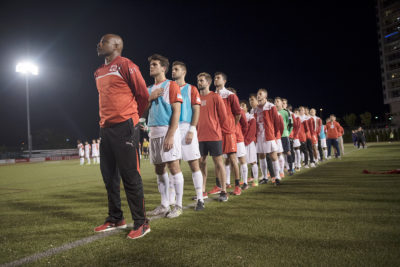
Since Colin Kaepernick first started kneeling during the national anthem in protest last year, many more professional athletes have joined in. Whether or not these protests are appropriate have been a point of contentious debate, and has worked its way onto Boston University.
The fact that important societal figures — including professional athletes — are participating in these controversial protests against racism and inequality makes the civil rights movement all the more powerful, Bruce Schulman, a history professor at BU, said.
“The participation of professional athletes and other celebrities … in protest movements,” Schulman said, “at once reflects the fact that these movements are becoming mainstream and are exerting more influence on the political system.”
In a conversation with Kevin Merida, senior vice president of ESPN’s “The Undefeated,” last month, Dean of Students Kenneth Elmore said he thinks the controversy over the anthem protests has escalated to the point where some may consider leaving the anthem out of sporting events altogether.
“I posed the question, ‘should we even continue to play the national anthem at sporting events?” Elmore told The Daily Free Press. “Why is it important for us at Boston University to continue, especially where we understand that it may force people into some political considerations that they may not want to have?”
Schulman added that playing the anthem before every sporting event is unnecessary and even a little arbitrary.
“We don’t play the national anthem … before movies, before plays, before concerts,” Schulman said. “I don’t think there’s a compelling reason to do it other than that it’s been done very widely since the 1960s.”
Neil Roberts, the head coach of the men’s soccer team, said he would support players who decide to sit or kneel during the anthem so long as they inform the team of their intentions beforehand.
BU athletes’ protests would be supported “as long as they discuss it with the team and made sure that we knew what their reasons were,” Roberts said. “As coaches, we’re a part of the team, but nobody has really done that.”
Students on campus expressed mixed opinions about national anthem and opposition to it.
Ivy Hedberg, a College of Communication senior, said she strongly believed that athletes have the right to protest during the playing of the anthem.
“If you want to protest, then that’s your right,” Hedberg said.
As to whether or not BU should continue to play the anthem, Hedberg said, “I don’t know if we should, but I personally don’t think I would be offended. I think it’s an interesting proposal.”
Emma Roy, a College of Arts and Sciences sophomore, said she believes the players who kneel should be supported.
“There’s an injustice in our society and that we need to raise awareness to it,” Roy said, “so that brings awareness to it.”
Conversely, some argued that kneeling during the anthem is disrespectful to those who have made sacrifices for the United States.
Tigran Melkonian, a CAS senior, said he thinks kneeling during the playing of the national anthem is, in fact, unpatriotic because of what the anthem stands for.
“[The anthem] would represent the creation of America and maybe the sacrifices people have made for the creation of America … I want to say [kneeling] is unpatriotic.”
Archana Bajaj, a second-year graduate student in the College of Engineering, disagreed with that sentiment.
“Maybe one person thinks that he or she feels more patriotic if they are standing up and giving attention,” Bajaj said. “Respect is different from person to person.”
Some students said regardless of the anthem’s meaning and protesters’ motives, they did not see the necessity in ceasing to play the anthem at sporting events.
Cole Schneider, a freshman in the Questrom School of Business, said he thinks the anthem should continue to be played at sporting events, and whether athletes wants to kneel or stand is their personal decision to make.
“[Protesting] shouldn’t offend anyone,” Schneider said. “If they don’t want to stand, they don’t have to stand. I think [the playing of the anthem] is also a sporting routine. When you go to a sports game, they usually play it. I think it should definitely still play.”
Similarly, Will Denton, a CAS freshman, said he thinks the anthem should continue to be an integral part of the U.S. sporting tradition.
“The national anthem being played at sporting events is a tradition that shows support for our country,” Denton said. “I think playing the national anthem … should stay.”


Really interesting article. Well done!
Great article to help raise awareness and help others consider different perspectives on the issue. Nicely done!